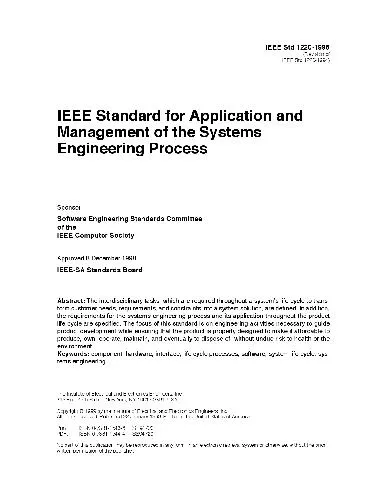Systems Engineering Principles and Practice
4.5
بر اساس نظر کاربران

شما میتونید سوالاتتون در باره کتاب رو از هوش مصنوعیش بعد از ورود بپرسید
هر دانلود یا پرسش از هوش مصنوعی 2 امتیاز لازم دارد، برای بدست آوردن امتیاز رایگان، به صفحه ی راهنمای امتیازات سر بزنید و یک سری کار ارزشمند انجام بدینکتاب های مرتبط:
معرفی جامع کتاب "Systems Engineering Principles and Practice"
کتاب "Systems Engineering Principles and Practice" یکی از منابع برجسته در حوزه مهندسی سیستمها است که به وسیله الکساندر کوسیاکوف، ویلیام ن. سویت، سم سیمور و استیون ام. بیمیر تألیف شده است. این کتاب به بررسی اصول و شیوههای مهندسی سیستمها میپردازد و به عنوان منبعی معتبر و جامع برای مهندسان و دانشجویان این رشته شناخته میشود.
خلاصهای از کتاب
این کتاب در چهارچوبی منظم و متعادل به بررسی فرآیندها، روشها و ابزارهای استفاده شده در مهندسی سیستمها میپردازد. نویسندگان تلاش کردهاند تا مفاهیم پیچیده را به زبانی ساده و قابل فهم برای مخاطبان با سطوح مختلف آگاهی از مهندسی سیستمها توضیح دهند. اهداف کلی این کتاب شامل فهم بهتر مفاهیم سیستمها، طراحی و پیادهسازی آنها و همچنین مدیریت و ارزیابی پروژههای مهندسی سیستمها میباشد. در بخشهای مختلف این کتاب، خواننده با موضوعات اساسی مانند تعریف سیستمها، فرآیندهای توسعه سیستم، الزامات، طراحی و اعتبارسنجی آشنا میشود.
نکات کلیدی
- توضیح دقیق فرآیند Systems Engineering و اهمیت هر یک از مراحل آن.
- بررسی ابزارها و تکنیکهای جدید در مهندسی سیستمها.
- مطالعه موردی پروژههای واقعی برای تجسم بهتر مطالب ارائه شده.
- ارائه استراتژیهایی برای مدیریت ریسک و پیچیدگی در پروژههای سیستمها.
جملات معروف از کتاب
"مهندسی سیستمها فرآیندی است که هر گام آن برای کسب اطمینان از اینکه سیستم نه تنها نیازهای فعلی بلکه نیازهای آینده را نیز برآورده میکند، طراحی شده است."
"در مهندسی سیستمها، درک جامع از نیازهای مشتری، نقطه شروع همه فرآیندهای طراحی است."
چرا این کتاب اهمیت دارد؟
کتاب "Systems Engineering Principles and Practice" به عنوان یک منبع جامع و مفصل در زمینه مهندسی سیستمها اهمیت بسیاری دارد، زیرا:
- بهبود فهم و درک فرآیندهای پیچیده در مهندسی سیستمها را تسهیل میکند.
- به عنوان کتابی مرجع در دانشگاهها و صنایع مختلف مورد استفاده قرار میگیرد.
- ابزارهای کارآمد و استراتژیهای کاربردی را برای توسعه و مدیریت پروژههای بزرگ و پیچیده ارائه میدهد.
- به مهندسان و مدیران کمک میکند تا با رویکردی سیستماتیک و جامع به مسائل و چالشهای پیش روی پروژهها بپردازند.
Introduction to 'Systems Engineering Principles and Practice'
Welcome to the comprehensive introduction of 'Systems Engineering Principles and Practice', a book crafted to become an indispensable resource for anyone involved in the multifaceted world of systems engineering. This text is the guideline on how to navigate the complexities of designing, developing, and managing large-scale systems that meet stringent engineering and business requirements.
Detailed Summary of the Book
In 'Systems Engineering Principles and Practice', the authors delve deep into the fundamental aspects of systems engineering, integrating both the theoretical and practical dimensions of the field. The book kicks off with an exploration of the genesis of systems engineering as a discipline, laying the groundwork with its historical context. This is followed by a meticulous unraveling of the systems approach, which serves as the cornerstone for effective problem-solving in intricate engineering projects.
The book seamlessly combines technical depth with accessibility, thus catering to both newcomers and seasoned professionals in the field. Readers are guided through the stages of the systems engineering lifecycle, from concept exploration and system design to implementation and operation. Furthermore, the text emphasizes the importance of interdisciplinary teamwork, highlighting how various engineering and management specialties converge and necessitate effective communication and collaboration.
The authors integrate real-world examples and case studies to provide tangible insights and reinforce the theoretical concepts discussed. As readers progress, they are exposed to modern systems engineering practices and emerging tools, which are critically examined in the context of evolving technological landscapes.
Key Takeaways
- Systems engineering is an interdisciplinary approach that aims to ensure the successful realization of complex systems.
- The book outlines a comprehensive framework for systematically addressing project uncertainties and complexities.
- It emphasizes the importance of lifecycle thinking, from conception through to disposal, in optimizing system performance.
- Readers gain insights into the practical application of systems engineering principles through detailed case studies and examples.
- The text promotes the value of collaboration and communication among different engineering disciplines and stakeholders.
Famous Quotes from the Book
"Systems engineering begins with understanding the whole before encapsulating the parts."
"The heart of systems engineering is the effective collaboration of diverse specialties toward a common goal."
"Every system has attributes that cannot be understood solely from the sum of its components. It's the interactions that hold the secret."
Why This Book Matters
The significance of 'Systems Engineering Principles and Practice' extends beyond the realm of academia and professional circles. As the complexity of engineering projects grows in tandem with technological advancements and globalization, there is a pressing need to ensure that systems are conceived, designed, and maintained in a coherent manner. This book provides the blueprint for achieving such coherence, making it invaluable to engineers, project managers, and corporate leaders alike.
One of the critical aspects that make this book stand out is its ability to bridge theory and practice. Whether you are a student seeking foundational knowledge or a practitioner looking to refine your methodologies, the insights offered here will equip you with the necessary tools to achieve excellence in systems engineering.
Moreover, in an era where sustainable and resilient system architectures are imperative, this book guides readers in considering the environmental and economic impacts of their engineering decisions, thus shaping them into conscientious innovators.
In conclusion, 'Systems Engineering Principles and Practice' stands as a pivotal contribution to the field, equipping readers with both the mindset and skillset required to excel in the dynamic world of systems engineering. Its relevance and applicability make it a cornerstone resource for the advancement of engineering practices in the contemporary era.
دانلود رایگان مستقیم
شما میتونید سوالاتتون در باره کتاب رو از هوش مصنوعیش بعد از ورود بپرسید
دسترسی به کتابها از طریق پلتفرمهای قانونی و کتابخانههای عمومی نه تنها از حقوق نویسندگان و ناشران حمایت میکند، بلکه به پایداری فرهنگ کتابخوانی نیز کمک میرساند. پیش از دانلود، لحظهای به بررسی این گزینهها فکر کنید.
این کتاب رو در پلتفرم های دیگه ببینید
WorldCat به شما کمک میکنه تا کتاب ها رو در کتابخانه های سراسر دنیا پیدا کنید
امتیازها، نظرات تخصصی و صحبت ها درباره کتاب را در Goodreads ببینید
کتابهای کمیاب یا دست دوم را در AbeBooks پیدا کنید و بخرید
1521
بازدید4.5
امتیاز0
نظر98%
رضایتنظرات:
4.5
بر اساس 0 نظر کاربران
Questions & Answers
Ask questions about this book or help others by answering
No questions yet. Be the first to ask!

















